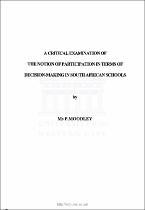| dc.contributor.advisor | Sayed, Yusuf | |
| dc.contributor.author | Moodley, P | |
| dc.date.accessioned | 2023-06-22T08:00:37Z | |
| dc.date.available | 2023-06-22T08:00:37Z | |
| dc.date.issued | 1995 | |
| dc.identifier.uri | http://hdl.handle.net/11394/10330 | |
| dc.description | Magister Educationis - MEd | en_US |
| dc.description.abstract | Democratic participation has come into vogue in South African politics, especially education, yet the notion of participation as it relates to decision-making in the arena of school governance remains a concept lacking in clarity. This mini-thesis sets out to investigate critically, the notion of participation in terms of decision-making, with specific reference to black South African schools. Chapter One sets the context of this discussion by illustrating that democratic participation appears to be a focal point of interest amongst the various stake-holders in the arena of education, the two principal contenders being the state and the historically oppressed black community. It is illustrated that both the state as well as the oppressed community maintain that participation in decision-making is central to effective educational administration, yet there exists major conflict between them about what constitutes the notion of participation. This mini-thesis proceeds to argue that the root of this conflict between the state and the oppressed community emerges from their different understandings of the notion of participation in decision-making. Stemming from the conflict between the state and the oppressed community about what constitutes the notion of participation in decision making, Chapter Two proceeds to explore the multiple meanings of the concept. I argue that equality in the exercise and control of decision-making in the arena of school governance forms the essence of participation. Chapter Three undertakes an historical genesis of participation in decision-making of both the state as well as the oppressed community. Thereafter both the state and the oppressed community's notion of participation in decision-making is analysed and critiqued, against the backdrop of the working definition of participation established in Chapter Two. Chapter Four recaps the main trends of my argument in this mini-thesis and then proceeds to revisit the working definition of participation as established in Chapter Two. The theory of negotiation is briefly explored, as a possible option for further refining the notion of participation in decision-making in the arena of school governance. Chapter Five concludes my discussion by arguing that effective participation in decision-making is vital in establishing a democratic education system in South Africa. | en_US |
| dc.language.iso | en | en_US |
| dc.publisher | University of the Western Cape | en_US |
| dc.subject | Decision making | en_US |
| dc.subject | Conflict | en_US |
| dc.subject | South African schools | en_US |
| dc.subject | Educational administration | en_US |
| dc.subject | School management | en_US |
| dc.title | A critical examination of the notion of participation in terms of decision-making in South African schools | en_US |
| dc.rights.holder | University of the Western Cape | en_US |

